By Rabson Kondowe (Lead Writer)
Martha Mastala knew something was wrong with her 5-year-old son when she noticed that he was less jovial than usual, so she took him to Wimbe Health Centre in Kasungu district, Central Malawi, where he tested positive for malaria. The health centre had run out of anti-malaria drugs, but an order had been placed for the drugs to come via a drone. “I had never heard anything about drones,” she recalls.
To her surprise, about 25 minutes later a drone delivered Artemether‐lumefantrine (AL), which is a first line of treatment for uncomplicated malaria in Malawi. “I was able to get the drugs and I followed the dosage prescribed by the health worker. Within three days, my boy recovered. If not for the drone, my son would not have received medication.”
Wimbe Health Centre in the village of Wimbe is about 31 kilometers away from Kasungu District Hospital. The health facility gets medical supplies from the hospital, which is a difficult, bumpy drive on dirt roads. To compound matters, when it rains, the roads in Wimbe become impassable, making it extremely difficult for cars to navigate and get essential medical supplies through to the health centre.
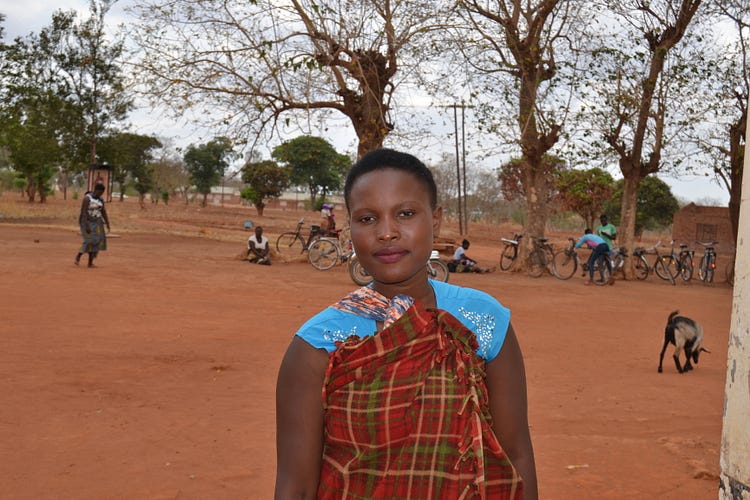
Drones to the Rescue
Availability of essential medicines is a key determinant of universal health coverage, yet achieving this presents a major challenge in low-income countries like Malawi, especially in rural areas. Poor roads mean that essential medication takes a long time to reach health centres. Since time is of the essence in health care delivery, today, Wimbe Health Centre is among eight government health centres in Kasungu where drones deliver medical supplies through the Malawi-German drone and data aid project. Since November 2020, Gesellschaft für Internationale Zusammenarbeit-GIZ and a German drone manufacturer, Wingcopter, have been working together to strengthen medical supply chains to remote areas in Malawi, to ensure that patients in these disadvantaged regions are able to access essential medication.
The project uses W178 bi-directional drones which have some of the longest ranges of any drones currently in operation. They can fly up to 120 kilometers and a trip that may take an hour by car, becomes a quick 20–25-minute drone flight, depending on weather conditions, particularly wind strength. The drones deliver essential medicines like antibiotics, anti-malaria drugs, malaria rapid diagnostic test kits (MRDT), Oxytocin vials, umbilical clamps, clotrimazole vaginal tablets, pregnancy test kits, and pain relief medication like paracetamol, aspirin and lidocaine injection. These essentials are placed in a cargo container at the bottom of the drone.
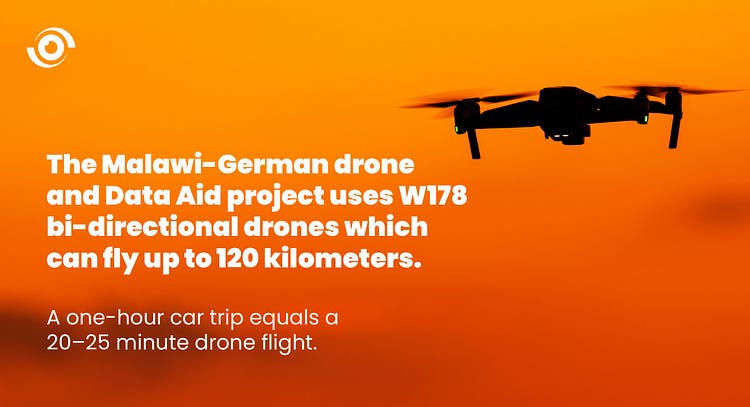
“We want to make sure that people in rural areas have continuous access to quality health care because often enough, they are deprived of such,” said Charles Matemba, Technical Adviser for GIZ Malawi. “We deliver medicine at any time but of course that happens if only the medicine is available at the district hospital. Health officers in charge at each health centre have to notify the district hospital the type and number of medical essentials they require, similarly, the Wingcopter team has to be notified in order to make the medicine pick up at the hospital.”
As of August 2021, the drones have made 166 medical supply drone deliveries in the eight health centres in Kasungu with a total of 210 kg of medicine supplied, according to project data.
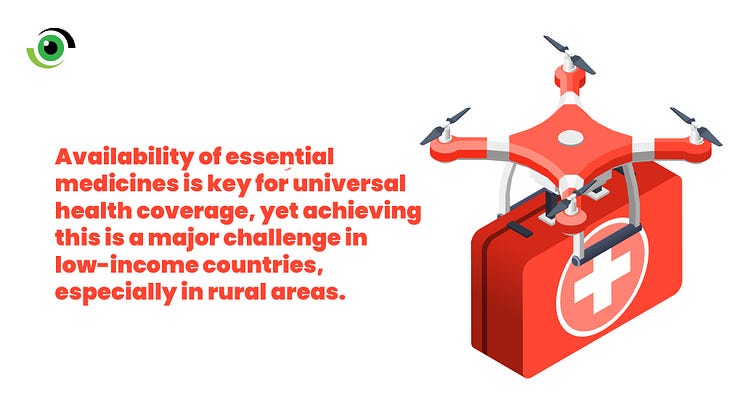
Lester Nyalugwe, a health worker at Wimbe Health Centre, confirms that the drone program has significantly reduced the waiting time for patients. “Previously, when we ordered drugs from the district hospital, it took two weeks or maybe more, to reach us due to logistical challenges at the hospital. It was very tough for us to help patients because often times, there was no medicine and other medical equipment because of such logistical problems,” he said. “But with the coming in of the drones, medical supply at the health facility has improved and we are even able to help patients on the spot.”
Faith Banda, 30, who lives in Wimbe, believes that the drones are creating a significant difference in making sure that children and families in the area are getting the care they need. “Just two weeks ago, my baby got sick, and I was able to get medication. Lack of medication at Wimbe Health Centre is appearing to be a story of the past, all thanks to drones,” she said.
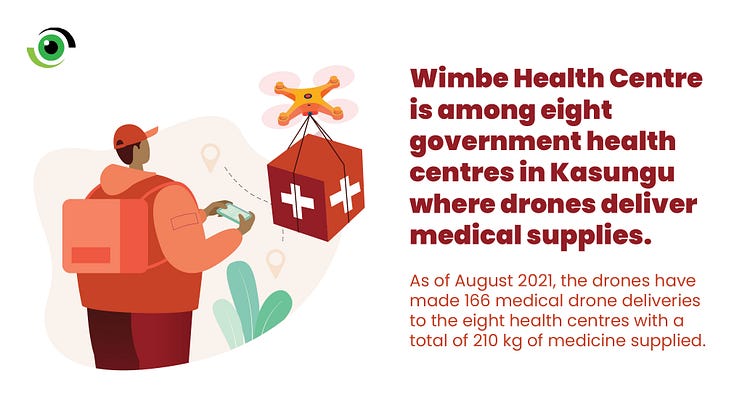
However, as with any initiative, there are challenges, one of which is that the drones have a maximum weight of 6 kg. This means that the drones do not have the capacity to carry all the essentials that a health centre may require. “We only hope that in the near future the program will introduce drones that will have the capacity of carrying more medical essentials,” said Nyalugwe. There was a time a drone lost direction due to network reception. “Last month a drone hit a tree due to poor network but luckily this happened when it was about to land here at the health centre, so we were able to get the supplies,” he added. Nevertheless, the project only has three drones in operation because others have been damaged. As such, it is becoming somewhat difficult to operate in all the eight health centres in Kasungu, Matemba admits. However, the project is expected to receive more drones this month.
The project also works closely with communities in Kasungu. “For instance, when a drone has crashed somewhere, people here at Wimbe are told to immediately report the matter at the health facility so that necessary arrangements are made to collect the drone and deliver the medical essentials,” said Village Headman of Wimbe, Simon Chimayimba. “Before the program started, people were sensitised on what drones are and how they operate.”
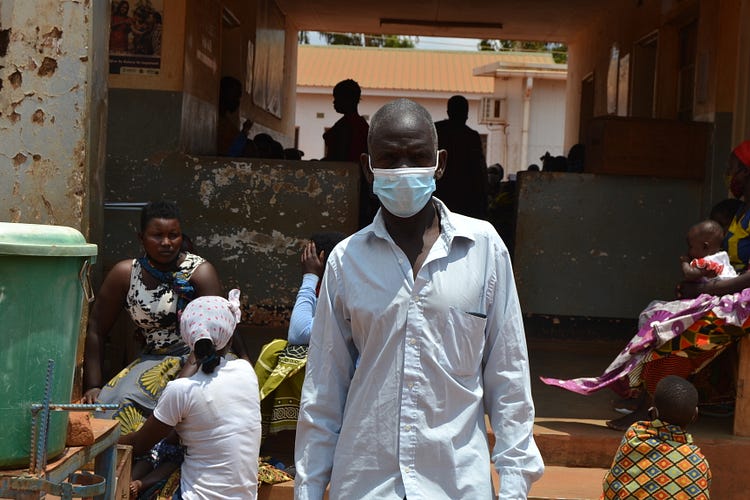
According to Charles Matemba, technical adviser for GIZ Malawi, the drone program is being extended to other districts in central Malawi. “We are now taking this program to districts like Dowa and Ntchisi, these are also places where a lot of people fail to access essential medicine,” he said. Since GIZ Malawi and Wingcopter’s primary focus is the central part of Malawi, the Ministry of Health is also working with other partners on a similar project in the southern part of the country. “Our hope is that this program is carried out across board in such hard-to-reach settings. Going by this, in the southern region we are working with Village Reach which has partnered with Super Yellow, we hope to find an operator soon in the northern part of the country,” says Rumbani Sidira, the Drones Desk Officer in the Ministry of Health. VillageReach is an international non-governmental organisation while Super Yellow is a local non-governmental organisation, both of which operate in Malawi.
Drones and the COVID-19 Response
Drone technology can also be harnessed in a nation’s COVID-19 response. In countries like China, the government has incorporated drone technology into their COVID-19 response and in February it was reported that Zipline, a company that delivers blood, vaccines, and other medical equipment was building an end-to-end cold chain distribution capability to distribute COVID-19 vaccines in Rwanda, Ghana, Nigeria, and rural and remote parts of the United States.
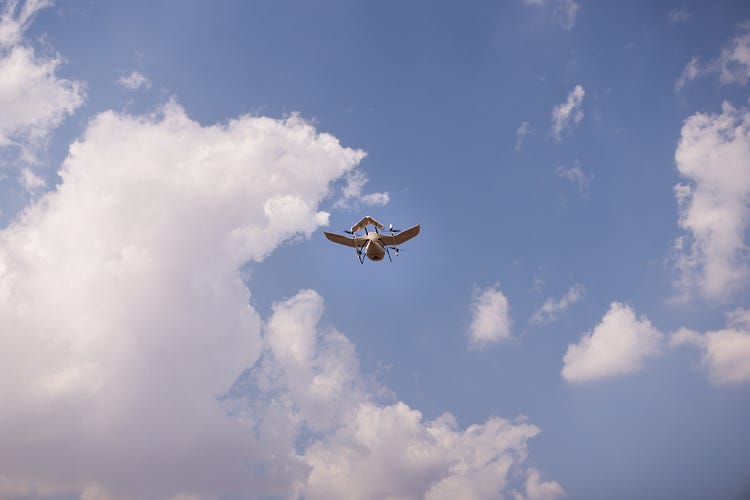
This program can be especially helpful in Malawi’s pandemic response as drones could quickly transport COVID-19 vaccines to hard-to-reach areas like Wimbe. The drone and data aid project team already have plans in the pipeline to begin the distribution of the vaccines. According to Matemba, the team is finalising the “demonstration flights” phase where they transport pretend samples packed in blocks of ice. Their aim is to determine if the samples can maintain the right temperature until they reach their destination since the vaccines are required to be stored at very low temperatures. Matemba is optimistic that the program will also begin collecting laboratory samples for two-way deliveries. “We want drones to be a regular conduit for health facilities, so we are looking at the possibility of transporting HIV and TB samples,” he said. The drone programme is helping to bridge the gap in health care delivery to hard-to-reach areas. It indeed has incredible potential to support health and life in rural Malawi.


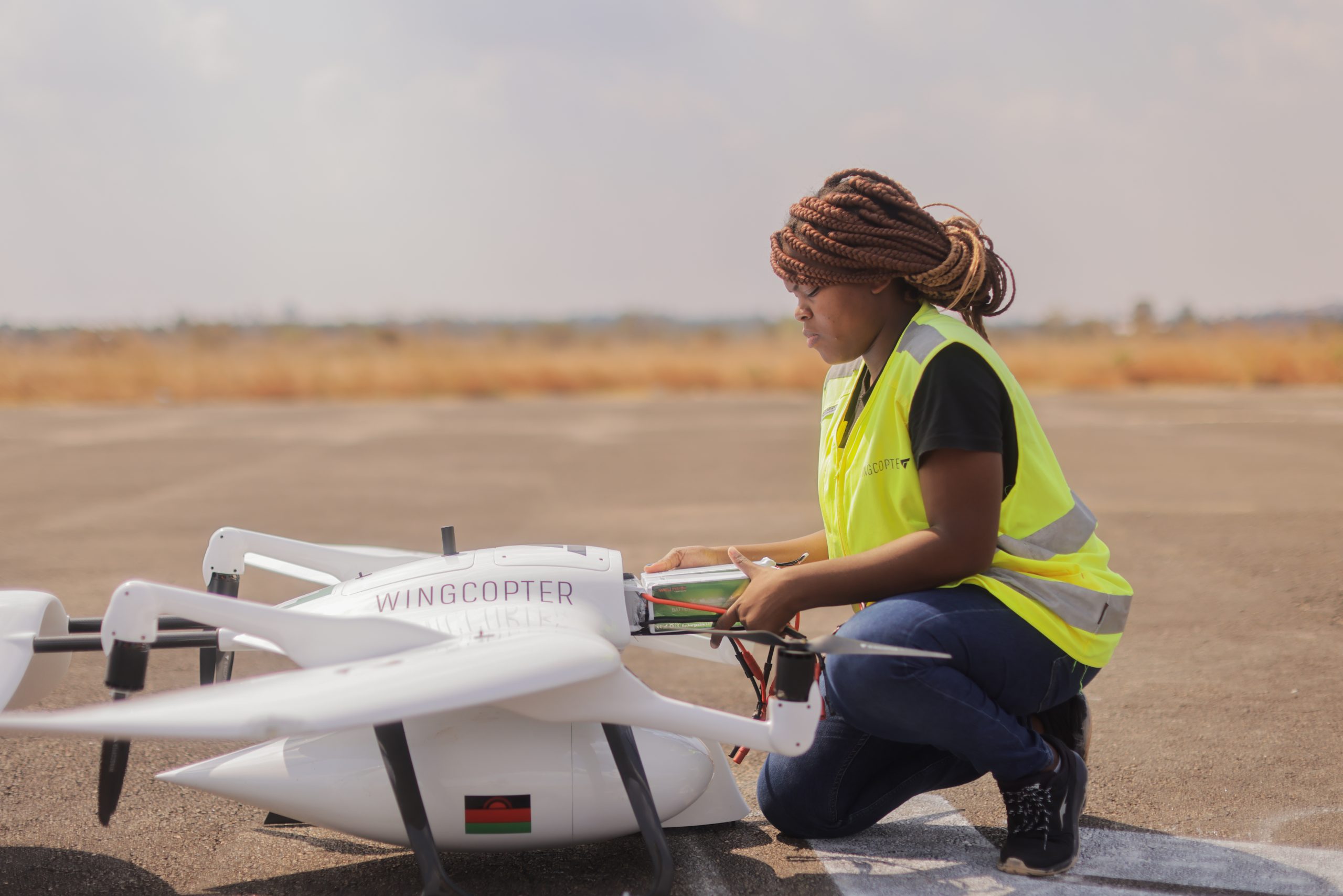
I’m really impressed about this drone delivery system, especially it’s use to bridge the gap in health care delivery. A very good innovation. I wish every African country will key into this drone delivery system.